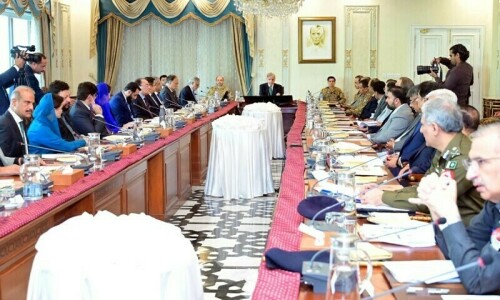WASHINGTON, Nov 28: US President George W. Bush has gone public with his administration’s reservations about Nawaz Sharif’s commitment to the war on terror, saying the former prime minister’s relations with religious parties raised doubts about his ability to do so.
“I don’t know him well enough,” Mr Bush said in an interview to American news agency AP when asked to comment on Mr Sharif’s return. He, however, noted that Mr Sharif had good relations with Pakistan’s religious parties, which raised doubts about his commitment to battling the Taliban and Al Qaeda.
“I would be very concerned if there is any leader in Pakistan that didn’t understand the nature of the world in which we live today,” Mr Bush said. The comments prompted the US media, which had already been expressing similar doubts about Mr Sharif since his return to Pakistan, to look back at the Sharif era with suspicion and doubt.
Several mainstream US newspapers – Wall Street Journal, New York Times, Herald Tribune, San Francisco Chronicle – quoted senior US officials as saying that they worry Mr Sharif’s potential role in any new Pakistani government could undermine efforts to hunt down Al Qaeda and Taliban militants, as well as hinder broader initiatives to modernise Pakistan’s economy and society.
They cite Mr Sharif’s political alliance with Islamist parties and his past weaknesses in coordinating counterterrorism actions with the US when he served as prime minister in the late 1990s.
“Sharif’s agenda is different. His agenda is to walk away from advances” made in Pakistan targeting the promotion of women and civil society, a senior US official told the Wall Street Journal.
“We’re really talking about moving back to the ‘90s, which means weak political parties. What’s the interest in that for Pakistan’s stability?”
Mr Sharif and his supporters have repeatedly denied US charges that he was soft on terrorism. They cite extensive efforts by his government to help the Clinton administration hunt down Osama bin Laden. They said Mr Sharif worked extensively for peace with India during the Kargil crisis in 1999. US officials said their concerns with Mr Sharif stretched beyond terrorism. They cite an attempt by Mr Sharif’s government in the 1990s to adopt strict Islamic penal codes.
“Mr Sharif’s return forebodes a strengthening of the religious right, which already has more seats in parliament than when he was prime minister,” The New York Times noted. Some officials blamed Mr Sharif for ‘condoning the nuclear proliferation efforts’ of Dr A.Q. Khan, ‘which aided the nuclear weapons programmes of North Korea, Libya and Iran,” San Francisco Chronicle pointed out.
It was also Mr Sharif who strongly supported the Taliban, sponsors of Osama bin Laden in securing power in Afghanistan, the Chronicle added. Other US officials, however, said Washington might be able to cooperate with Mr Sharif if he became prime minister again.
“There’s probably some bitterness towards us,” held by Mr Sharif, one such official told the Journal.
“But a few months down the road, I believe we’d probably have a working relationship.” Daniel Markey, a former State Department official now with the Council on Foreign Relations, told the Journal that ‘Washington appears to have taken a back seat, or at least a stance of resignation at the inevitable, as the Saudis, perhaps Pakistan’s most revered ally, engineered the return of Mr Sharif.”
Other newspapers noted that Mr Sharif’s return complicates the Bush administration’s support for Benazir Bhutto whom Washington has favoured as a more secular politician, and a more certain partner against Islamic extremists.
The US media pointed out that Washington’s distrust of Mr Sharif goes back to 1998, when President Clinton tried to persuade the Pakistani leader not to conduct a nuclear test but he ignored him.
The media noted that while Mr Sharif railed against Gen Musharraf for meddling with the Supreme Court, his supporters invaded the same court when he was the prime minister.
Several newspapers quoted Bruce Riedel, a member of the National Security Council in the Clinton administration, as depicting Mr Sharif as an ‘unforthcoming’ and ‘reluctant’ leader who did not know how to steer his country out of trouble during the Kargil crisis. Mr Riedel was one of a handful of Clinton administration officials who participated in the Sharif-Clinton meeting in Washington on July 4, 1999, held to prevent an allout war with India.
In a footnote to the saga, Mr Riedel recounts that Mr Clinton urged Gen Musharraf not to execute Mr Sharif as Gen Zia had executed prime minister Zulfikar Ali Bhutto in 1979.
“With our encouragement, the Saudis pressed hard for Sharif’s freedom,” Mr Riedel said, and finally in December 2000 he was sent into exile to the kingdom, from where he has now returned.















































Dear visitor, the comments section is undergoing an overhaul and will return soon.